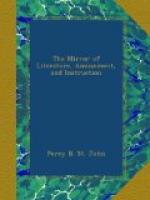art of representing in his drawings the forms of organic
tissues in a style peculiar to himself. His last
course of lectures, on the History of the Natural
Sciences, and on the Philosophy of Natural History,
delivered at the College of France, is now publishing
in livraisons, and will extend to three or four vols,
8vo. This work, however, we believe, has been
published without his consent or revision. His
memory was prodigious, and he scarcely knew what it
was to forget anything. Although his great powers
were more particularly devoted to natural history,
no part of science was a stranger to him, and his
taste for literature and works of imagination was
particularly refined and elegant. In his Eloges
of illustrious men, delivered in his capacity of perpetual
secretary of the Academy of Sciences, he always displays
the utmost impartiality and love of truth; he never
debased the dignity of science by any love of intrigue,
and displayed the utmost disinterestedness in his
efforts to promote science. The qualities of
his heart were not less estimable than those of his
head, and he possessed the happy art of inspiring
his friends with an unalterable attachment. His
conversation was varied and animated, adapted by turns
to every subject, and he may truly be said to have
been the grace and ornament of society. We must
not forget the great services he rendered to public
education as head of the University; his Report on
the State of Primary Education in Holland is a lasting
monument of his solicitude for the education of the
people, and all those who have observed his conduct
with regard to the higher branches of education, know
how constantly his influence was directed to favour
their progress and to remove obstacles. In other
departments of the civil service into which he was
successively called, as Master of Requests, Counsellor
of State, President of the Section of the Interior,
Director of Protestant Worship, (for he was an enlightened
and liberal Protestant, and watched over the interests
of his co-religionists with constant solicitude,)
and at last as a Peer of France—in all these
he displayed the same superiority of talent.
The office of Censor of the Press, which was offered
to him, he, to his eternal honour, refused. Such
was the man whose loss the world has now to deplore:
but the mind that traced her age and history—in
the wrecks of ages dug from her bosom—will
live for ever in his works to enlighten and instruct
mankind.—Foreign Quarterly Review.
Cuvier is said to have died of a paralytic affection of the oesophagus. His body was examined by several eminent pathologists: his brain is stated to have presented a mass of extraordinary volume, weighing three pounds thirteen and a half ounces; a fact which will be treasured up by contemporary phrenologists as evidence of Cuvier’s great intellectual capabilities.
[Cuvier was Professor of Geology in the College of France. The chair, vacant by his death, has just been filled by the appointment of M. Elie Beaumont, celebrated for his investigation of mountain formations.]




